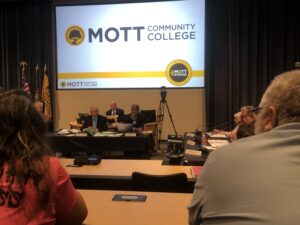In an East Village Magazine exclusive interview, incoming Mott Community College (MCC) Interim President Shaunda Richardson-Snell responds to early criticism of her recent appointment by the college’s Board of Trustees.
By Kate Stockrahm
Mott Community College announced the appointment of interim president Shaunda Richardson-Snell this week amid vocal opposition from faculty and community members.
Richardson-Snell is currently the principal for Aquila Advisors in Bloomfield Hills, Mich. and holds a Master of Business Administration from the University of Michigan-Flint.
The interim presidency will be Richardson-Snell’s first role in higher education — a point of criticism that came up in dozens of public comments during a Board of Trustees meeting on July 15, 2024 — though she has over 24 years of finance and treasury experience in public, private, non-profit and private equity-owned corporations, including General Motors and TI Fluid Systems.
The Vote to Approve
The MCC Board of Trustees approved Richardson-Snell’s contract on Monday evening after voting 5-2 to move both a closed session to review the contract’s terms and the vote on its approval to happen ahead of public comment.
That vote audibly upset the meeting’s audience, made up of so many faculty, staff and community members that the Regional Tech Center auditorium saw attendees standing along staircases and leaning against entryway walls after its 120 seats were filled.

Audience members look on during a Mott Community College Board of Trustees Meeting on July 15, 2024. (Photo by Kate Stockrahm)
“Mr. Chair, I believe we deserve to hear from the public before we make a decision,” Trustee Michael Freeman said after both he and Trustee Art Reyes lodged objections to the move.
Board Chair Andy Everman, who had put forward the agenda changes, thanked Freeman for his comment before calling the vote, which he, Vice President Janet Couch, Treasurer Jeffrey Swanson, Secretary Wendy Wolcott, and Trustee John Daly III then approved.
During the closed session, MCC faculty union president Kim Owens told East Village Magazine she was “dismayed” — not only that the Board chose not to include stakeholders like faculty, students and the community in their selection, but that the vote she just witnessed seemed a “deliberate tactic” to avoid transparency in their process.
“We were told at a Board meeting that there were 25 applicants. Then we were told there were four finalists,” Owens said. She added that no scoring rubric for the selections was shared and the Board took “less than 20 minutes of deliberation” to select Richardson-Snell from the finalists.
“And, they chose the only candidate with no higher education experience,” Owens concluded, gently shaking her head.
Owens’ sentiments soon became a recurring point in the meeting’s more than 40 public comments, which were offered after the same Board members voted 5-2, along the same lines as the prior vote, to approve Richardson-Snell’s contract.
The Contract
Richardson-Snell’s contract was not shared directly as part of the July 15 agenda, but the Board’s counsel, William Brickley, read some of its terms aloud ahead of its approval.
According to Brickley, Richardson-Snell will be:
- paid $237,500 annually;
- provided with moving expenses up to $15,000;
- provided with a “car allowance” of $800 monthly;
- paid “actual, reasonable cell and mobile expenses;”
- covered by liability insurance of up to $1 million for actions she performs on behalf of MCC;
- paid an expense stipend of $668 per month “to cover things like local travel, meals expenses and things of that sort;”
- offered 14 days of vacation and seven sick days for 2024, which will not carry over to 2025;
- eligible for payments to a retirement plan, with contributions of 15% of her annual salary paid “directly to her” for that benefit;
- and provided a $20,000 term life insurance policy.
The contract is at-will, Brickley explained, meaning it can be terminated at any time for any reason, “or no reason at all.” He said it would take a properly-noticed vote of the Board to do so, and Richardson-Snell could also choose to resign with 30 days notice to the college.
While the college did not confirm EVM’s request for the length of the contract’s term, a July 16 press release from Richardson-Snell’s public relations team noted the contract was for six months, starting July 22.
The Feedback
After the vote to approve her contract, Richardson-Snell and her lawyer left the auditorium — a move which was criticized in multiple public comments throughout the evening, along with her lack of higher education experience.
“Members of the Board, I have spent my entire career teaching political science to college students. I have no formal training in aeronautics, but I have flown many times, and I watch many documentaries on airplanes. I even have an airport close to my house, so I see planes fly over all the time,” read a comment submitted by MCC Political Science Professor Christine Stoliecki. “Plus, I’ve studied political science. I know a lot about the FAA [Federal Aviation Administration]. So let me ask you, given my experience and knowledge, if you found out that I was chosen by the people in this room to fly your plane, would you stay on the plane?”
While Stoliecki’s comment drew laughs and applause from the assembled audience, her message was more serious.
“Appointing Shaunda Richardson-Snell to the role of interim president over the other candidates is akin to choosing me to pilot your plane over Sully Sullenberger,” the letter continued, citing the famed pilot who expertly landed a plane on the Hudson River in 2009 after both engines failed in a bird strike. “You trivialize the work and expertise required of a college president, and if this appointment stands, you will damage the integrity of this institution.”
Stoliecki went on to say “shame on you” to the Board for its decision, and “shame on Richardson-Snell for accepting a position where she is clearly out of her depth.”
Other commenters expressed deep concern over the college losing its accreditation — a proof of educational quality in higher ed spaces – due to the decision.
Dr. Chris Engle, union president of the college’s supervisor and management unit, went so far as to lay out an ultimatum. He noted that when accreditation comes into question, “an institution could face irreversible consequences” such as losing the ability to participate in federal financial aid programs for its students.
He urged the Board to recall Richardson-Snell’s selection and reappoint acting interim acting president Jason Wilson until a permanent president could be selected.
“If, in fact, this board continues with the current selection of Shaunda Richardson-Snell, our union will be prepared to begin official notice to the Higher Learning Commission regarding the board’s violation of the student practices of accreditation governance as it pertains to the hiring of an interim president,” he warned.
Other speakers emphasized their concern over the college being referred to as “a business” — a term offered positively by some Board members during Richardson-Snell’s interview process at a prior meeting.
“Education is not a business. Profit is not the goal. Mott Community College is not a financial company,” read a comment from Dr. Amy Gilley, Dean of Arts and Humanities. “It is a comprehensive community college whose mission is to educate, to research, and to support community needs.”
Gilley also questioned Richardson-Snell’s motives for seeking out the position, as did a handful of other commenters.
Interim President Richardson-Snell Responds
For her part, Richardson-Snell told East Village Magazine that she was surprised at the mostly negative response to her hiring on Monday night.
“I was surprised because it showed me they clearly didn’t know me,” the incoming MCC interim president said in an exclusive interview on July 16. “It was really unfortunate that more time and care wasn’t taken to get an understanding of what I bring to the table before making those just, you know, those disparaging comments.”
Richardson-Snell noted that she had wanted to stay for public comments, but her lawyer and representative had advised her against doing so.
“I argued with both the attorney and him [my representative],” she said. “And they insisted, and I said, ‘I do not want my team to think that I will ever walk out on them.’… That is not me. I do not leave my team.”

Mott Community College Interim President Shaunda Richardson-Snell. Richardson-Snell is set to take office on July 22, 2024. (Photo courtesy Shaunda Richardson-Snell)
Even without being in the room, Richardson-Snell learned what was said and had her own responses to questions around her qualifications for the role.
“… there’s a growing trend in higher education to recruit business executives and industry leaders into the top position,” she said on a phone call. “And so perhaps my background is different than what they’re used to seeing, but I’ve acquired a deep, broad set of financial acumen and skill set at negotiating strategic planning, crisis management, communication and enterprise leadership skills, and all of those align perfectly with the role of president at MCC.”
When asked about why she wanted the position, she cited her desire to “return home” after having spent the first 45 years of her life in Genesee County as well as her personal connections to the college.
“Mott is a household name for me,” she explained. “My brother holds two associates degrees from Mott. My sister attended the dental assisting program. And so I view Mott as a bedrock and iconic institution in Genesee County.”
She added that she viewed the role as an opportunity “to give back to the next generation” and that she has “a heartfelt passion for today’s youth and ensuring that they’re equipped with the tools for success that they need in today’s economic environment and the workplace.”
Despite faculty concerns over viewing the college as a business, though, Richardson-Snell did not back down on her position there.
“The college is an enterprise, and it offers a product. And its product is education,” she said. “But in order to deliver that product, there are a tremendous amount of operations and outside influences and circumstances that need to be managed, risks that need to be identified and mitigated, and opportunities that need to be pursued and exploited, and efficiencies that need to be identified and strengthened.”
She added that while she hadn’t held “this particular role” before, she has “led enterprises that offer product.”
So the product is changing, but the fundamentals and the principles that I can bring are the same,” Richardson-Snell said.
What’s Next
Richardson-Snell said she wasn’t discouraged about the early feedback on her hiring, saying instead, “It’s served to embolden me” and calling the concern over her lack of higher education experience, “laughable.”
“I actually do have eight years of higher education experience from arguably the most important vantage point, which is that of a student,” she explained. “I hope that the entire staff, faculty, student body and the Board of Trustees will agree with me on that point. It’s the most important vantage point, and that’s what we’re there for.”
Regarding the faculty’s accreditation concerns, she said one of her top priorities “will be to liaise with the Higher Education Forum in order to begin that relationship and dialog.” She added that she’s confident in the MCC team already responsible for accreditation compliance and she views her role with the college and greater community as “one of support and serving.”

Directional sign near the Prahl Building on Mott Community College’s campus. (Photo by Tom Travis)
She said that means removing roadblocks and determining together “what’s going well, what’s not going well;” letting “the experts be experts” in their field; and working toward “growing the school and increasing enrollment and graduation rates.”
While the college community’s negative feedback on Monday was directed at Richardson-Snell, it was also largely directed at MCC’s Board of Trustees.
Of the roughly 45 public comments, only a handful spoke positively of the Board’s decision or its handling of the interim president’s selection process. Most, like the one submitted by Sean Murray of Flint, said things like:
“Mott Community College Board of Trustees: well, you have certainly outdone yourself this time. If your goal is to completely ruin Mott Community College’s long history of serving in this community, you are well on your way… Did the Board seek insight from employees, including administrators, staff, faculty, community, students, HR anyone, or did they simply bulldoze through the process as they have everything else? Under this board in the newly appointed interim president, Mott is at risk of losing its accreditation. And if they do, make no mistake, it will be because of you. ”
The day after the contract vote, Flint resident and MCC adjunct instructor Patrick Hayes filed recall language against three of the five trustees who voted in favor of Richardson-Snell’s contract: Couch, Daly, and Wolcott.
Hayes told EVM that Michigan law would not allow him to file against the other two trustees, Everman and Swanson, as their terms end in December 2024, or he would have done so.
A hearing date on that petition language has not been set as of press time. Richardson-Snell is set to take her seat at MCC on Monday, July 22.


You must be logged in to post a comment.